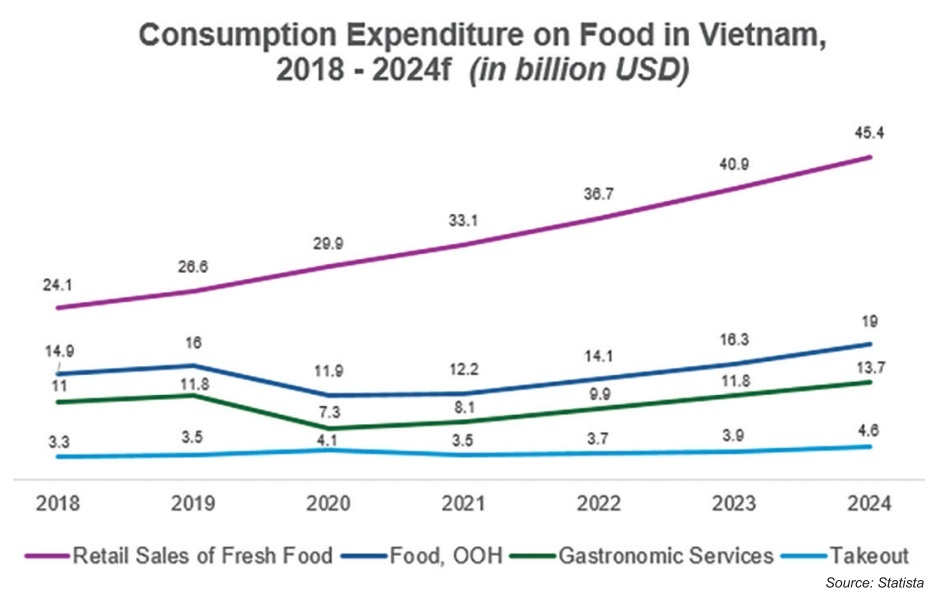A retail strategy for brands to tackle Vietnam’s meal tradition
 |
| Mai Bui, Consultant, Ipsos Strategy3 |
In 2023, the government effectively kept inflation in check, ensuring relative socioeconomic stability in the face of global economic upheavals. Nevertheless, the agricultural sector, alongside key manufacturing industries, grappled with challenges such as diminishing global demand, order shortages, and escalating production costs.
This year, the global economic environment remains filled with unpredictability, casting doubts on the course of Vietnam’s economic revival.
According to the General Statistics Office, total retail sales of goods and consumer service revenue in 2023 experienced a comparatively modest 9.4 per cent increase, contrasting with the more substantial growth of 20.8 per cent recorded in the same period in 2022.
The 2020 Vietnam Household Living Standards Survey revealed a notable pattern in household spending, especially concerning food and dining. In the decade from 2010 to 2020, a considerable part of household expenditure (over 80 per cent) was allocated to food staples and groceries, far outweighing spending on eating out, which accounted for 10.5 per cent.
In the face of current economic uncertainties, consumers are becoming even more discerning and cautious with their spending. The focus has decisively shifted towards necessities and products that offer authentic value, sidestepping the tendency for impulsive shopping. This transition towards prioritising essential commodities, such as food and groceries, and a concurrent decrease in non-essential consumer services, including accommodation and dining out, is clearly delineated in a Q4 2023 report from the General Statistics Office.
 |
Vietnamese family meals have always served as a fundamental pillar within the cultural tapestry of the country. However, they are not immune to the evolving dynamics of contemporary life. Our recent research survey was carried out in October 2023, and featured around 400 people aged 15-65 across Vietnam. It encompassed a wide array of perspectives from urban centres to rural landscapes, and identified four key values intrinsically linked to the tradition of Vietnamese family meals.
In the first instance, the family dinner table serves as a safe port in our age of constant digital connectivity. The survey pointed out that more than half of consumers across all generations enjoy home meals more than five times per week. A home-eaten meal serves as a beacon of stability and solace in the tempest of everyday life, fostering a sense of comfort and cultural continuity.
The second value emphasises the importance of balance and moderation in consumption for health and wellness. This equilibrium is found between the appeal of a home-cooked meal and the conscious pursuit of nutritional wellbeing, reflecting a holistic approach to food and health.
The third core value shows how the act of sharing home meals symbolises more than just nutrition. It represents the gesture of love and inclusivity, cementing and strengthening the familial bonds. This collective participation transcends the boundaries of simple nutrition, becoming an embodiment of love, sharing, and unity within the family.
Finally, there is the role of technology in maintaining connections, particularly when families are dispersed across geographical boundaries. According to the Ipsos survey, one in every three individuals had at least one meal at home with a distant family member via a digital platform.
This indicates that the concept of virtual meals is gaining traction, enabling families to bridge physical distances and preserve the essence of togetherness. This ensures that the familial connection remains unbroken, preserving the continuity of the tradition of family meals, regardless of distance.
For brands, understanding these pillars is key to crafting meaningful connections with Vietnamese consumers. Ipsos has identified several ways that brands can connect with Vietnamese consumers through home meals.
Firstly, brands can champion family traditions by showcasing products and services that simplify meal preparation and elevate family moments. By becoming partners in preserving cherished rituals, brands can embed themselves within the fabric of these familial experiences.
Secondly, brands can embrace the balancing act of health and flavour. By innovating with products that seamlessly blend delicious taste with health-conscious ingredients, brands can sync with the growing consumer inclination towards better health. A lifestyle survey conducted by Euromonitor in 2022 found that two-thirds of Vietnamese consumers actively seek healthy ingredients in their food and beverages.
The third strategy encourages fostering inclusivity. Brands can design solutions that empower all family members to participate in mealtime, reflecting the shifting dynamics of family roles and responsibilities. Such an approach acknowledges the evolving familial structures and ensures everyone feels included in the mealtime experience.
Lastly, in an era where distance is no longer a barrier to connection, brands can help bridge these distances. By developing tech-enabled solutions that enhance virtual meal experiences, brands can foster connections even when families are physically apart.
 | Heading into an enthralling 2024 Vietnam in 2023 could be most remembered for strengthening cross-border ties, pushing through new laws, or taking action to weather the storms created by trade issues, geopolitical conflict, inflation, and the post-pandemic landscape. CEOs, legal advisors, and directors across tech, banking, retail, real estate, and more reveal what they thought of the previous 12 months in Vietnam, and offer their projections for the barriers and boosts to come during the Year of the Dragon. |
What the stars mean:
★ Poor ★ ★ Promising ★★★ Good ★★★★ Very good ★★★★★ Exceptional
Related Contents
Latest News
More News
- Citi economists project robust Vietnam economic growth in 2026 (February 14, 2026 | 18:00)
- Sustaining high growth must be balanced in stable manner (February 14, 2026 | 09:00)
- From 5G to 6G: how AI is shaping Vietnam’s path to digital leadership (February 13, 2026 | 10:59)
- Cooperation must align with Vietnam’s long-term ambitions (February 13, 2026 | 09:00)
- Need-to-know aspects ahead of AI law (February 13, 2026 | 08:00)
- Legalities to early operations for Vietnam’s IFC (February 11, 2026 | 12:17)
- Foreign-language trademarks gain traction in Vietnam (February 06, 2026 | 09:26)
- Offshore structuring and the Singapore holding route (February 02, 2026 | 10:39)
- Vietnam enters new development era: Russian scholar (January 25, 2026 | 10:08)
- 14th National Party Congress marks new era, expands Vietnam’s global role: Australian scholar (January 25, 2026 | 09:54)

 Tag:
Tag:















 Mobile Version
Mobile Version